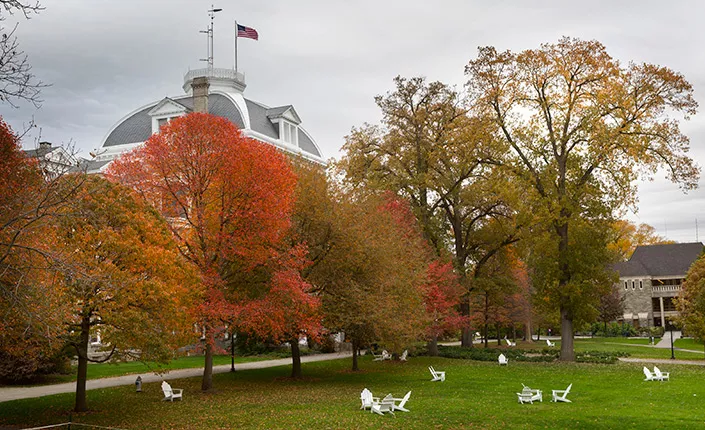Self-Study on Campus Climate Identifies Strengths, Challenges

Members of the College community learned the results of the College's Self-Study on Learning, Working, and Living during two open meetings held last week in the Lang Performing Arts Center.
“This snapshot will help inform our understanding of where we’re succeeding and where we need to improve and introduce change into our culture,” said President Valerie Smith as she introduced the presentation. “We shouldn’t be afraid either to take pride in what we’re doing well, or to admit where we’re falling short.”
The results are based on the responses from a representative sample of students, faculty, and staff (980 in total) who completed a survey last spring. The overall response rate of 38 percent represents 34 percent of students, 47 percent of faculty, and 43 percent of staff.
Presented by Sue Rankin of Rankin & Associates, the results indicate that 64 percent of students, faculty, and staff are “comfortable” or “very comfortable” with the overall climate on campus. Climate in this context is defined as “current attitudes, behaviors, and standards of faculty, staff, administration, and students concerning the level of respect for individual needs, abilities, and potential.”
Of those who took the survey, nearly two-thirds of faculty and staff are comfortable or very comfortable with the climate of their department. Eighty percent of students and 90 percent of faculty members indicated they are comfortable or very comfortable with their classes. The College also received high marks on work-life issues and academic experiences and more than 80 percent of students express contentment with the extent of their intellectual development.
However, the study also revealed that nearly 25 percent of respondents have been affected by exclusionary, offensive and/or hostile conduct on campus, which many ascribed to their gender or position status. Additionally, some persons of color and LGBTQ participants indicate they are less comfortable with the campus, workplace, and/or classroom climate than the majority.
“It’s incumbent upon all of us to work together to address some of these problems,” says Diane Anderson, chair of the study’s organizing committee and associate dean of academic affairs and associate professor of educational studies. “We are very good at being critical here but, in my experience, we don’t always solve the problems we’re critical of.”
A working group of students, faculty, and staff was formed in 2014 to better understand campus climate issues. Seeking comprehensive data, it enlisted Rankin & Associates to conduct the campus-wide study, “Learning, Working, and Living: A Self-Study of Swarthmore College.” Rankin held 18 focus groups with 161 participants from all areas of the College community, and then used that data to inform the questions for the campus-wide survey.
The committee wants the College community to review and reflect on the report for the next several weeks. In the spring, it will present a series of community forums in which students, staff, and faculty can discuss findings and strategies to improve the campus climate. Based on these discussions, the College will identify three to four action steps.
It won’t be easy, notes Rankin, but Swarthmore is positioned to become a leader on campus climate issues.
“You’re small enough to make changes, you have a president who actively believes in the process, and you already have a social justice mission here,” she says. “Three things a lot of schools don’t have.”
The most important factor, though, will be the engagement of the community.
“It’s necessary to continue to listen to all community voices in multiple mediums as we boldly move forward and take tangible action toward improving Swarthmore for everyone,” says committee member Meghan Kelly ’18, of Wolcott, Conn. “I know the conversations and actions ahead of us will be challenging, but to me that makes the work even more exciting.”
Last week’s presentation, an executive summary of the report, and the full report can be found here.



